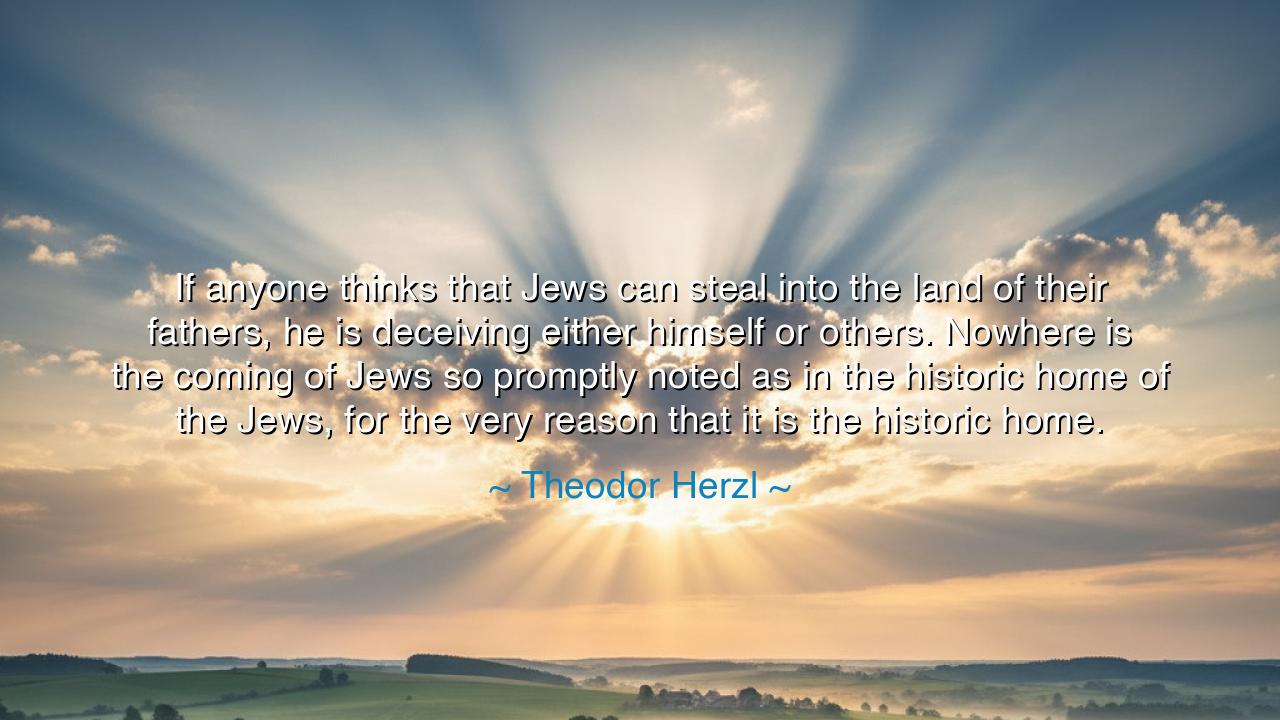
If anyone thinks that Jews can steal into the land of their
If anyone thinks that Jews can steal into the land of their fathers, he is deceiving either himself or others. Nowhere is the coming of Jews so promptly noted as in the historic home of the Jews, for the very reason that it is the historic home.






The words of Theodor Herzl—“If anyone thinks that Jews can steal into the land of their fathers, he is deceiving either himself or others. Nowhere is the coming of Jews so promptly noted as in the historic home of the Jews, for the very reason that it is the historic home”—resound like the voice of prophecy emerging from the tumult of exile. In these words, Herzl—the father of modern Zionism—speaks not merely of geography, but of destiny. His is not the tone of conquest, but of remembrance. He reminds his people, and indeed all of humanity, that there are certain bonds too ancient and too sacred to be severed by centuries of dispersion. To return to such a place is not an act of stealth, but an act of truth—the fulfillment of a covenant written not on parchment, but upon the soul of a people.
Herzl’s message was born from the pain of displacement, forged in an age when the Jewish people, scattered across continents, yearned for restoration yet faced relentless persecution. To the nations of the world, the idea of the Jews returning to their ancestral land seemed fantastical, even presumptuous. But Herzl saw with the eyes of vision that homeland and identity are not commodities that time can erase. The Jew’s relationship to the land of Israel was not one of ownership, but of origin. It was not something to be stolen, because it had never been lost—it had only lain waiting, like a heart beating beneath the dust of centuries.
In his declaration that “nowhere is the coming of Jews so promptly noted as in the historic home of the Jews,” Herzl expresses a paradox both profound and poignant. The land itself, he suggests, recognizes the return of its children. Their presence, long foretold, stirs echoes in its hills and winds. But he also acknowledges that this return would not go unnoticed by the world—that it would awaken passions, resistance, and fear. For in every age, when the exiled seek to return, the established powers tremble. The reclaiming of identity is always seen as a threat by those who profit from its erasure. Yet Herzl’s tone is not one of defiance, but of inevitability: what is rooted in truth cannot remain buried forever.
History abounds with examples of such restoration. Consider the story of Cyrus the Great, king of Persia, who after conquering Babylon allowed the Jews to return to Jerusalem and rebuild their Temple. The chroniclers of that age tell us that Cyrus recognized in their yearning something divine, something that transcended empire. Herzl, centuries later, would carry that same spirit into the modern age—not as a conqueror, but as a dreamer of justice, one who believed that a people’s right to return to their homeland is not an act of rebellion, but of reconciliation. Like Cyrus, he understood that the true strength of a nation lies not in the sword, but in the memory of its origin.
To Herzl, the “historic home” was more than a place of soil and stone—it was the heart of a people’s collective identity. The land of Israel had lived on in Jewish prayer, song, and scripture for two thousand years. Every Sabbath meal, every whispered Psalm, every breaking of bread was a remembrance of Jerusalem. This unbroken thread of memory is what gave his words their power. The Jew, he said, could no more “steal into” his homeland than a child could steal into the arms of his mother. The land itself bore witness to their bond—it was not possession they sought, but belonging.
Yet Herzl, the visionary, was also the realist. He knew that the world would not easily understand or accept such a return. His tone carries both the weight of warning and the fire of conviction. “If anyone thinks they can steal into it,” he says, “he deceives himself.” For he knew that the rebirth of a nation would not come quietly. It would demand sacrifice, unity, and courage. The awakening of a people is never a gentle thing; it shakes the foundations of history itself. And so it did. Herzl’s vision, dismissed by many as madness, became the seed from which modern Israel would one day grow.
From this quote, the lesson to all generations is eternal: truth cannot be hidden, and roots cannot be cut. Whether for a nation or for a soul, the journey home is never about conquest—it is about remembrance. Each person, in their own way, must one day confront their “historic home”—the place, the truth, or the calling that has always been theirs, though time and fear have made them forget it. Herzl’s words invite us to live with that same courage: to claim what is rightfully ours, not through pride or deceit, but through the quiet strength of authentic return.
So, my children, remember this: no one can “steal” what is already part of their being. Whether you seek a homeland, a purpose, or a peace long lost, walk toward it openly and bravely. For when the heart returns to what it has always loved, the whole world takes note—not in anger, but in awe. The earth remembers its children, and history, though slow to awaken, always bends toward homecoming.






AAdministratorAdministrator
Welcome, honored guests. Please leave a comment, we will respond soon